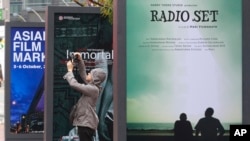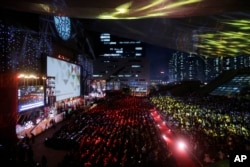Asia's largest movie festival kicks off Thursday at a time when the region's influence on the global movie industry is on the rise.
Entering its 20th year in the South Korean port city, the Busan International Film Festival saw its influence and size expand in stride with the growth of box office sales in the region.
Asian countries fueled growth in the global film industry last year, while box office sales in the U.S. and Canada declined. With box office sales of $12.4 billion in 2014, the Asian region is the biggest and fastest-growing movie market in the world, according to the Motion Picture Association of America.
Despite the growing influence of Asian cinema in the world, the non-competition movie festival has kept its bar of pretense and hierarchy low, unlike the historic yet hierarchical Cannes Film Festival, which turned away some women in flat shoes from a premiere this spring.
Busan cinemagoers - in flats or heels, part of the media or not - do more than just gaze at award-winning directors, K-pop stars and Hollywood celebrities gracing the red carpet. They happily stay in queues from the wee hours to get tickets, ask questions to filmmakers and actors after screenings, and join public talk shows with them on the beach.
While the glamor and glitz will not be lost in Busan, most moviegoers and industry officials will travel to South Korea's second-largest city to discover the next-generation Wong Kar Wai or Ang Lee. The festival's New Currents section, which premieres Asian feature movies from novice directors, has broken major talents, including Venice Film Festival Golden Lion winner Jia Zhangke. Its Asian Cinema Fund program has provided financial lifelines to promising filmmakers.
"There are a lot of movies completed by support from the Asian Cinema Fund, introduced in Busan for the first time in the world and then went on to international acclaim,'' said Kim Jiseok, the Busan Film Festival's executive programmer.
The festival has not been without challenges during its 20-year ride. The most recent setback was the budget cut by South Korea's government after the festival went ahead with the screening of a controversial documentary last year despite pressure not to.
The state-run Korean Film Council cut its support to the film festival this year by nearly half to 800 million won ($677,000) from 1.46 billion won ($1.2 million). Many viewed the budget cut as punishment for the festival's decision to screen the documentary, which was about the 2014 sinking of a ferry that left hundreds of people dead, most of them South Korean students on a school trip, and the government's much-criticized rescue operation.
"I felt then that our society's democracy had a long way to go,'' Kim said.
After the standoff with the government, Kang Soo-yeon, an award-winning actress, was appointed the festival's co-director. She has since vowed to stand for the value of freedom of expression.
After its opening on Thursday with "Zubaan,'' an India coming-of-age drama, the festival will screen 303 movies from 75 countries, including 94 world premieres.
Other things to watch for at this year's Busan International Film Festival:
Glitz and glamor
The glamor and glitz will be at its height when the A-listed celebrities walk the red carpet under the futuristic roof of the Busan Cinema Center on Thursday evening. The center's 85-meter (280-foot) -long roof displays moving images on its curvy metal surface, with lights beaming from hundreds of thousands of LED lamps. It provides what has become the festival's key image since its completion in 2011, as well as the official poster image this year.
An equally impressive list of movie stars is expected to walk the red carpet. From South Korea, iconic actress Jeon Do-yeon, who served as the Cannes Film Festival's feature section jury last year, will make an appearance. Heartthrobs Jung Woo-sung and Lee Jung-jae are expected to impress K-pop fans, while actress Tang Wei, who commands big followers in South Korea, will return to Busan on the first day of the festival.
A legion of veteran Asian filmmakers will gather to celebrate the festival's 20th edition as well. Chinese filmmakers Jia Zhangke and Hou Hsiao-hsien and director Johnnie To from Hong Kong are among those scheduled to join the opening ceremony. Silvia Chang, the veteran actress and director from Taiwan, is set to greet audiences as the head the New Currents section jury. Japanese director Kore-eda Hirokazu and Apichatpong Weerasethakul from Thailand are among those expected to be spotted on the streets of the harbor city, although their attendance at the red carpet event remains unconfirmed.
From Europe and the U.S., Nastassja Kinski, the German model and actress, is set to attend the festival for the first time as part of the jury. Sophie Marceau, Harvey Keitel and Tilda Swinton, a frequent visitor to South Korea, will also be there.
Rise of movies from outside East Asia
While Greater China, Japan and South Korea have been the preoccupation of the festival, this year's edition will see a rise of movies, actors and directors from outside East Asia. The co-host of the opening ceremony is Marina Golbahari, an actress from Afghanistan whose breakout role in the 2003 movie "Osama'' gave her fame. Out of the eight movies competing for a prize at the New Currents section, four are from outside China, Japan or South Korea. The section dedicated to unearthing hidden talents of Asian cinema has selected directors from Iran, Kazakhstan and India, showing the rise of emerging filmmakers beyond East Asia.
1960s Korean movies
A special section of the festival will feature a rare chance to watch black and white movies from South Korea made in the 1960s, when the country saw a sudden surge in movie making and watching. "The DMZ,'' by the late director Park Sangho, is more than a work of historic importance. It is the first movie that was shot in the demilitarized zone dividing the two Koreas, depicting the country's division through the eyes of two children. "The Body Confession'' and "The Door of the Body'' describe the lives of prostitutes.
Mirror of Asian society
Many Asian movies to be premiered at this year's festival mirror angst toward society's hyper-competitive system or raise questions about society's treatment of those who are left behind. "Reach for the Sky'' is a documentary that takes a rare look at the lives of South Korean high school students before and after they take the crucial college entrance exam that is believed to determine one's success in life. The fictional drama "4th Place" is a story of a teenage swimmer who is beat by his coach to improve his record and his mother who overlooks violence in favor of a better score. "Collective Invention,'' inspired by the Hwang Woo-suk scandal and his rise and fall, touches on various subjects, including youth unemployment and skewed media coverage.
A number of movies this year bring their focus to the life and death of the elderly in Asia. "Ashes to Ashes'' is a South Korean documentary about a man who holds funerals for those without any family. "Radio Set'' tells a story of an old Indian man whose attachment to an analogue radio causes friction with his son.






